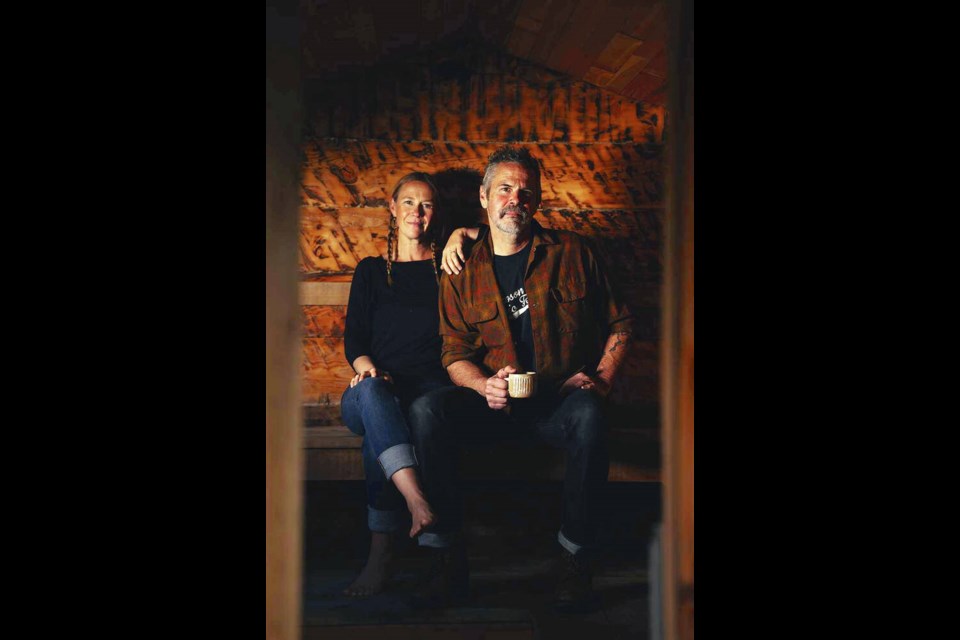PHARIS & JASON AND THE SWEET OLD BAND
Where: Victoria Event Centre, 1415 Broad St.
When: Nov. 13, 6:30 p.m.
Tickets: $38.59 from victoriaeventcentre.ca
If car fanatics can give pet names to their automobiles, Pharis Patenaude and Jason Romero can certainly do the same with their banjos.
The husband-and-wife duo, who perform as Pharis and Jason, eventually ran into a problem where this matter is concerned, however. With seven handmade banjos in need of naming, they had to dig deep to come up with monikers emblematic of the instruments’ individual character and identity.
To some, taking such care where instrument-naming is concerned might seem a touch precious. Not so with Romero and Patenaude. The couple runs a successful banjo-making business, J. Romero Banjo Co., from their property in Horsefly, B.C., a former mining camp near Williams Lake and Quesnel. Of the few people on Earth who have earned the right to treat their banjos like children, it’s these two.
End result? Seven new additions to their banjo family: Papillon, Big Blue, Clara, Birdie, Mother, Bella, Gourdo and The Beast, all of which Romero built by hand. “We were paying to tribute to what has been so important in our lives, from the building of the banjos to the tone of the banjos, and all the different tunings, and the construction of the instruments,” Patenaude said.
The couple has been making music — and banjos — for as long as they have known each other. When they first met in Victoria in 2007, the two musicians bonded over their love of songs from the public domain, a unique corner of the musical universe made up of folk songs, spirituals and standards with no specific author attributed. Three months later, they were married. The couple now has two children, ages six and nine.
“We would send each early recordings of old public domain music from the 1920s and ’30s,” Patenaude said. “That was our courting, sending strange recordings and saying: ‘Have you heard this?’ That was the early indication when we knew we were right for each other.”
The last two Pharis and Jason Romero records focused on the duo’s original songwriting. For their latest record, Tell ‘Em You Were Gold, Patenaude said they zeroed in on songs from the public domain — specifically ones written for banjo. “Banjos are the reason we met, and banjos are the reason we could move to Horsefly,” she said. “Banjos have been so good to us.
“That’s where the public domain is magic. What Jason and I have done compulsively over the years is spend as much as time listening to every version [of a song] that we can. That way you can really distil down what it is that draws you into that song. All of that time spent listening to all of those different versions is in your head while you’re trying to figure out how you can play it.”
Tone is a hugely important facet of the duo’s new album, their sixth, which was written and recorded in an old barn on the couple’s 40-acre homestead in the Cariboo. Romero adopted 12 different banjo tunings over the course of 16 songs, which gives the material its own old-timey feel, but had the potential to wreak havoc on their four-show Vancouver Island run, which wraps Sunday at the Victoria Event Centre.
There’s nothing worse for an audience than watching an artist repeatedly tune their instrument, but Pharis and Jason Romero have found ways to avoid the inevitable in that regard. “One of Jason’s great gifts is that he can hear the tunings in his head, and he’s able — while I’m trying to be glib and casual on stage, telling some silly little story — to totally change tunings on stage while we’re moving between two songs,” Patenaude said.
“Banjo tuning has become such a punchline. ‘Oh look, the banjo’s out of tune.’ But hang on a second. This is an art, trying to get an instrument in tune that is all made of moving parts. It’s terribly impractical, but the tunings themselves give such a vibe, it’s hard not to use them.”
Whatever the approach, it’s clearly working for the couple. Since 2016, Pharis and Jason Romero have won three Juno Awards for traditional roots album of the year, which puts them at the forefront of the roots music community in Canada. It also put them on the radar of many in the U.S. music industry, which is how they came to be signed to Smithsonian Folkways Records for Tell ‘Em You Were Gold.
Patenaude said when they took the idea of a banjo record built around songs from the public domain to their contact at Smithsonian Folkways, whom they had met years earlier at the Folk Alliance conference, he was “totally game.” Pre-sales for the recording, which arrived in July, were among some of the strongest in the label’s history, according to Patenaude — which is impressive considering the catalogue of the Washington, D.C.-based imprint includes culturally significant recordings by Pete Seeger, Woody Guthrie, Lead Belly and hundreds of others.
“We feel so honoured. They have been such a touchstone label for us. It feels insane to be a part of it.”



